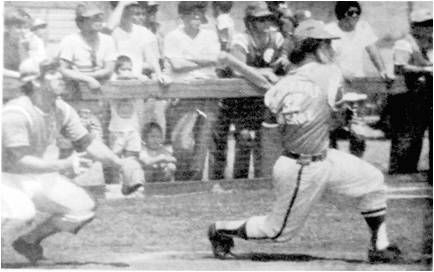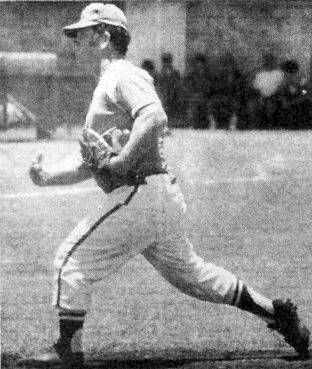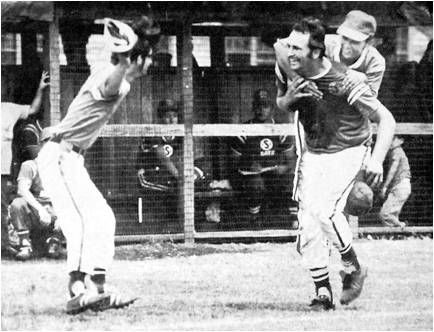Kalaheo’s boys of summer



The imposing pitcher looks in at the batter and adjusts his grip on the ball. It is a particularly hot day, and he wipes the sweat from his forehead and then readjusts his ball cap; he looks in at the plate and faces the batter. It is almost incomprehensible to watch as the pitcher whirls his body into the wind-up. His right arm becomes a freakish centrifuge, projecting the softball at a terrifying speed. The batter stands just forty-six feet away and has to make a split second decision as the spiraling ball rises then suddenly breaks down and away.
The determined hitter swings wildly at the specter of a pitch that evaporates before his very eyes. The ump calls the third strike and the slightly confused, and moderately angry player, is sent packing.
There is some grumbling coming from the away bleacher about the officiating, and a few words are exchanged from both sides, and so goes the battle of red dirt.
The year was 1967, and these were the great days of Fastpitch Softball on the island of Kauai.
Where the legends were our fathers, uncles, and cousins. My five-year-old self stood wild eyed behind the backstop as these giants’ hurled balls at dizzying speeds. The parks filled up the centers of the towns, and the communities all came together under the Hawaiian sun. Gaggles of boys hung under the feet of the players with a few logging time as batboys, and islanders of all ages filled the bleachers.
The games end was the beginning of parties small and large, with the men drinking and talking non-stop about the game. Meanwhile the women gathered nearby bantering amongst themselves while tending to all manner of needs, and generally keeping the ship on course. The kid’s vast world extended to the boundaries of the park, which sat in the shadow of the Kalaheo hills. These gatherings would melt into the setting sun as the brilliant sky shrouded the majestic greens and reds of the landscape. All the light and sound would eventually soften into the perfect harmony of the Kauai night.
The dominant play of Kalaheo ASA softball teams in the years between 1967 and 1972 culminated in a single powerhouse the Serenos Sausage Makers, or The Sausage Makers, a moniker coined by The Garden Island sports writer Peter “Naka” Nakashima. They were a balance and blend of solid veterans and hot young players. The Serenos Sausage Makers steam-rolled the opposition with lights out pitching, tight fielding and massive bats that left the opposition looking for answers in the grass.
They drew their abundant talent and drive from the rural town of Kalaheo. Many of the players were related by blood or marriage, and they worked, hunted, and lived together in a community that demanded physical endurance to survive.
As the 1972 season heated up, it soon became apparent that the Sausage Makers would repeat the Kauai ASA title of 71. They would also prove to be the most formidable ball team in the state. During the run up to the 72 state title, Serenos second basemen Pete Rayno hit .555, shortstop Wesley Arakaki hit .525, third basemen Brian Silva hit .475, and first basemen Bernard Perreira hit .445 for a combined team average of .385.
Nakashima later tagged them, “The Rampaging Sausage Makers.”
On July 24, 1972, the Mighty Sausage Makers captured the Kauai ASA title by hammering the Mix Breeds in an 11-5 win. They would wind up the regular season a perfect 11-0 after clobbering Pacmedia in another lop-sided victory. The Sausage Makers thus punched their ticket to the ASA state tournament for the second consecutive year.
Serenos 1972 ASA state tourney opener was played against the defending state champions Midas Muffler. The Sausage Makers defeated Midas and went on to win five of the six games en route to the state title including and extra inning battle with the Mix Breeds in the tournament finale.
The Kalaheo boys from the sparsely populated island of Kauai took on the best ASA ball players in the state of Hawaii of their time and shut them all down.
August 28, 1972, The Garden Island headline: “Serenos Capture State ASA Title”
The 1972 season would prove to be the zenith for the Sausage Makers and the very game of men’s fastpitch softball on Kauai.
Serenos would go onto play in the 1973 National ASA championship but the magic of the juggernaut Sausage Makers had reached its plateau at the end of the 1972 season. The 1973 National tournament was anticlimactic for the re-branded Oar House gang as they were now called. The Gang faced steep odds in the national tournament against seasoned teams that played 80 -90 games a year vs. the Hawaiians schedule of 11-15 games per year. Despite a good performance they were eliminated in the first two games thus ending a heroic campaign.
No other Kauai team would repeat a trip to the nationals. The state championship for Kauai would always belong to the 1972 Sausage Makers.
Men’s fastpitch softball would be played on Kauai for a few more years after the 1972 season. Then the game started a low arcing decline until its disappearance near 1979. The ballpark in Kalaheo was subsequently bulldozed to make way for a community center and the very essence of fastpitch itself was erased from the town.
All that now exists of the “72 Sausage Makers” are the memories of the few who played, and the yellowed news clippings that gave testament to the greatness of an era nearly forgotten by time.
